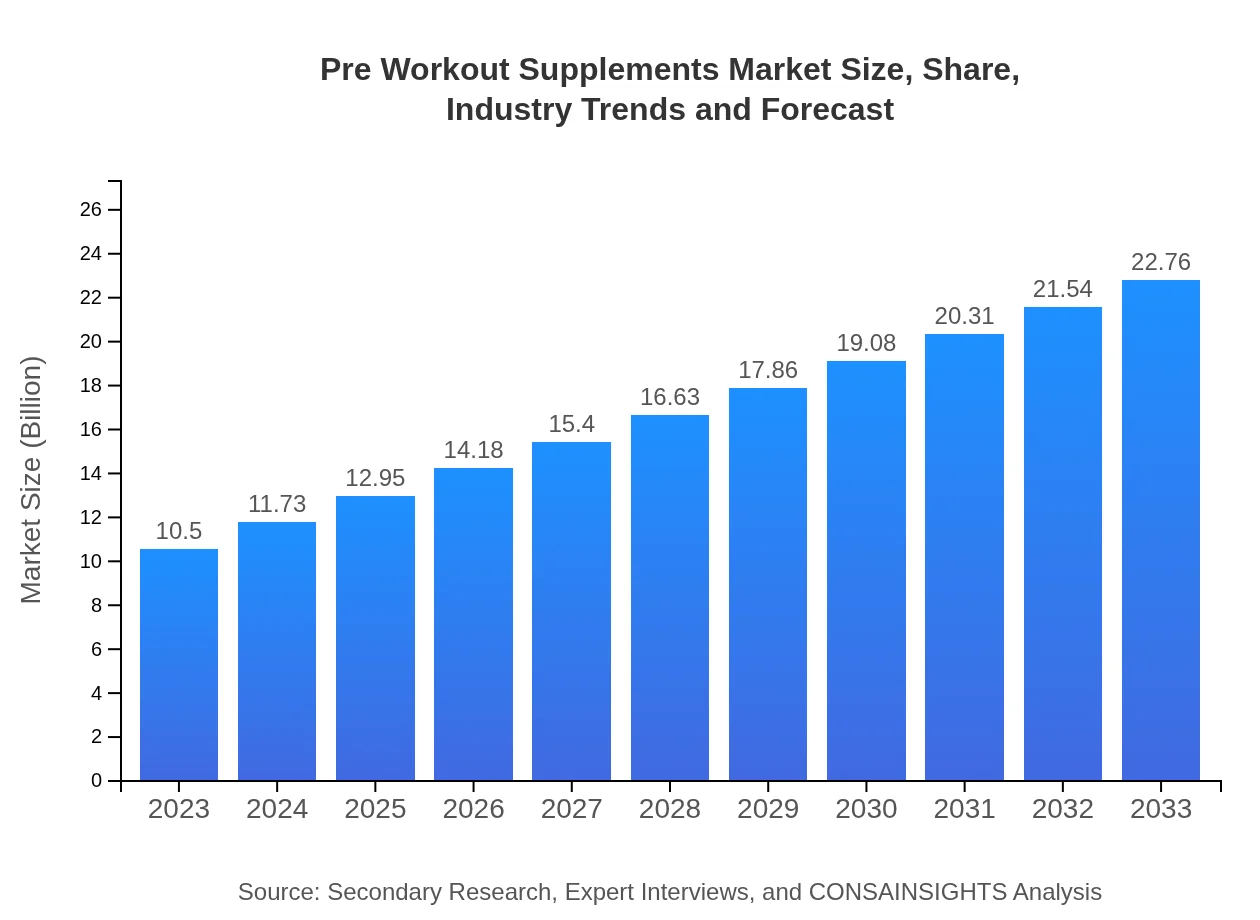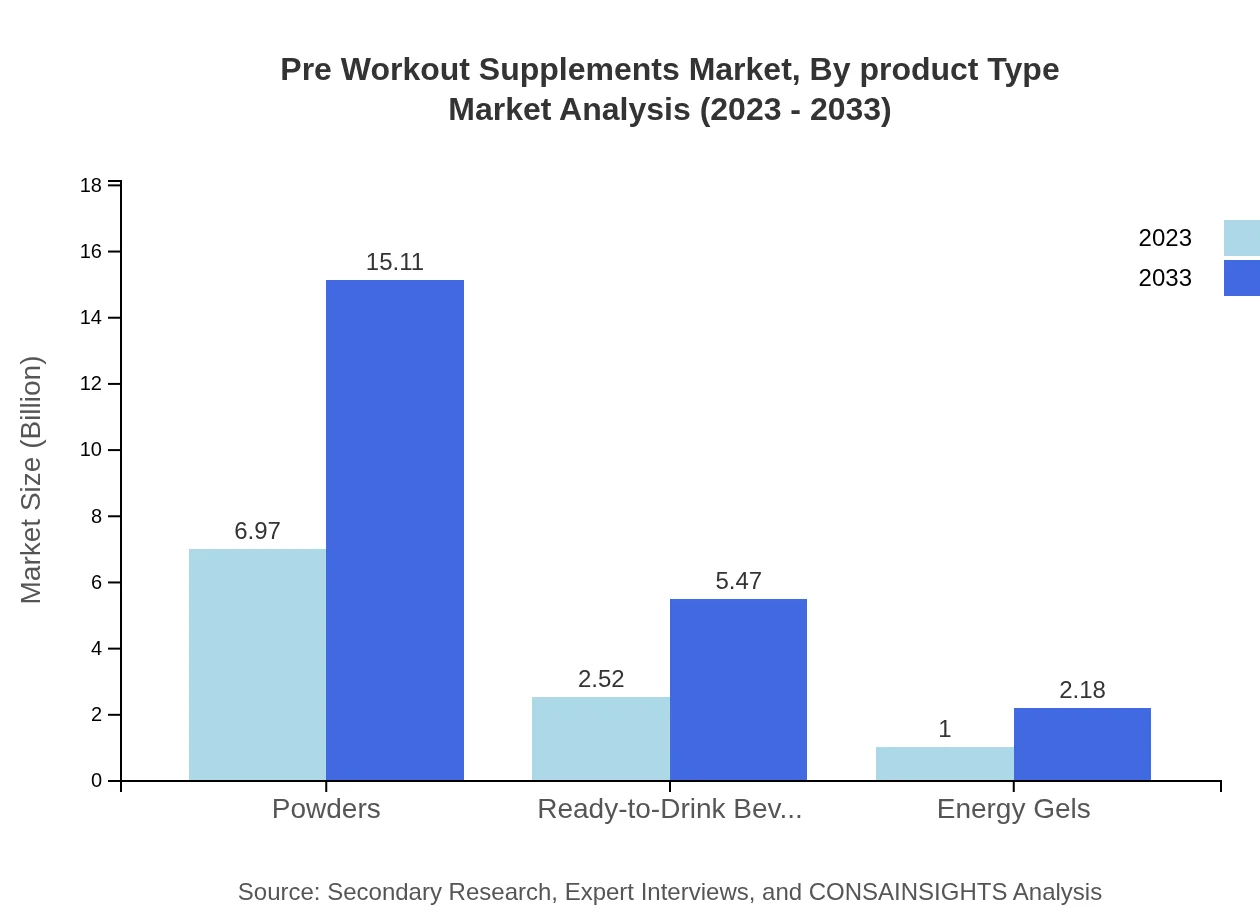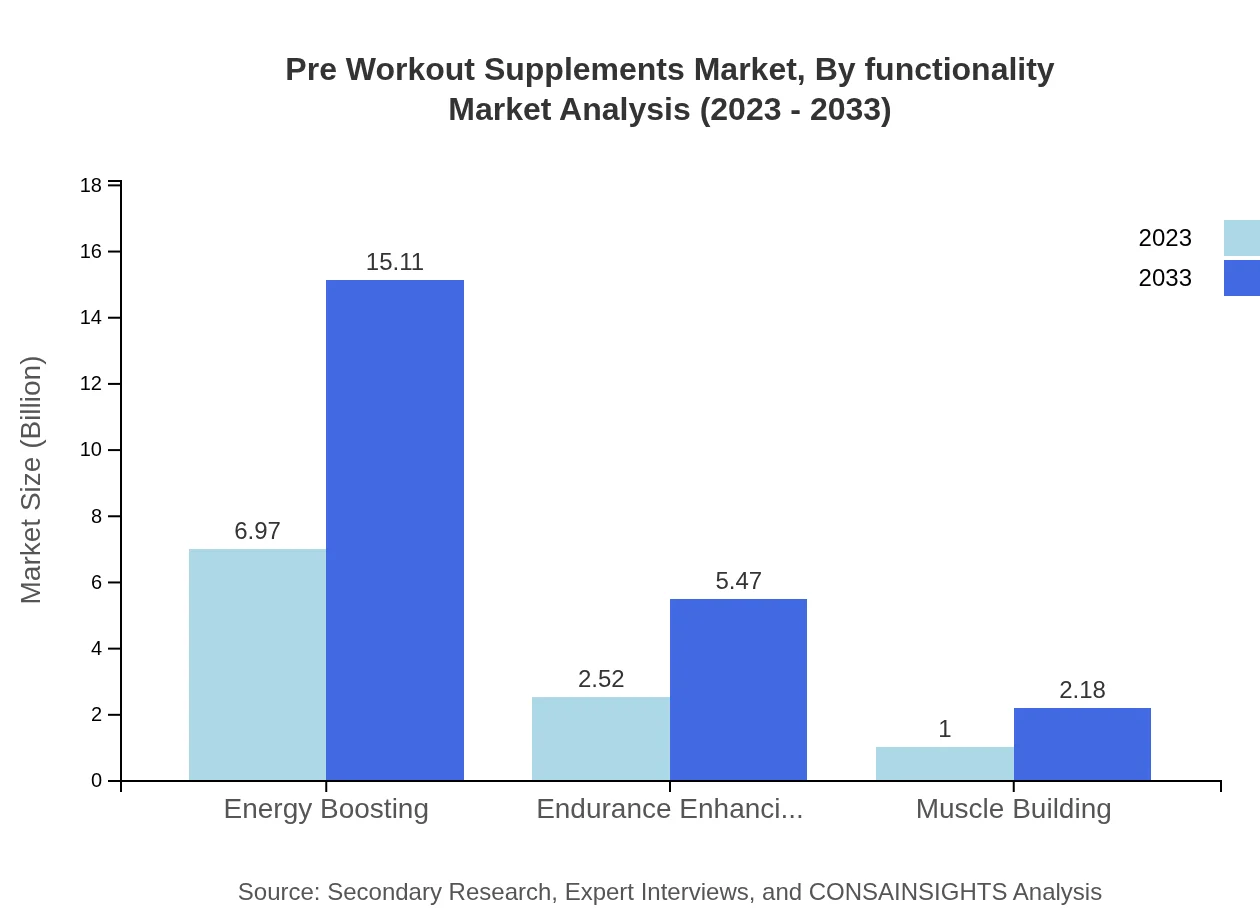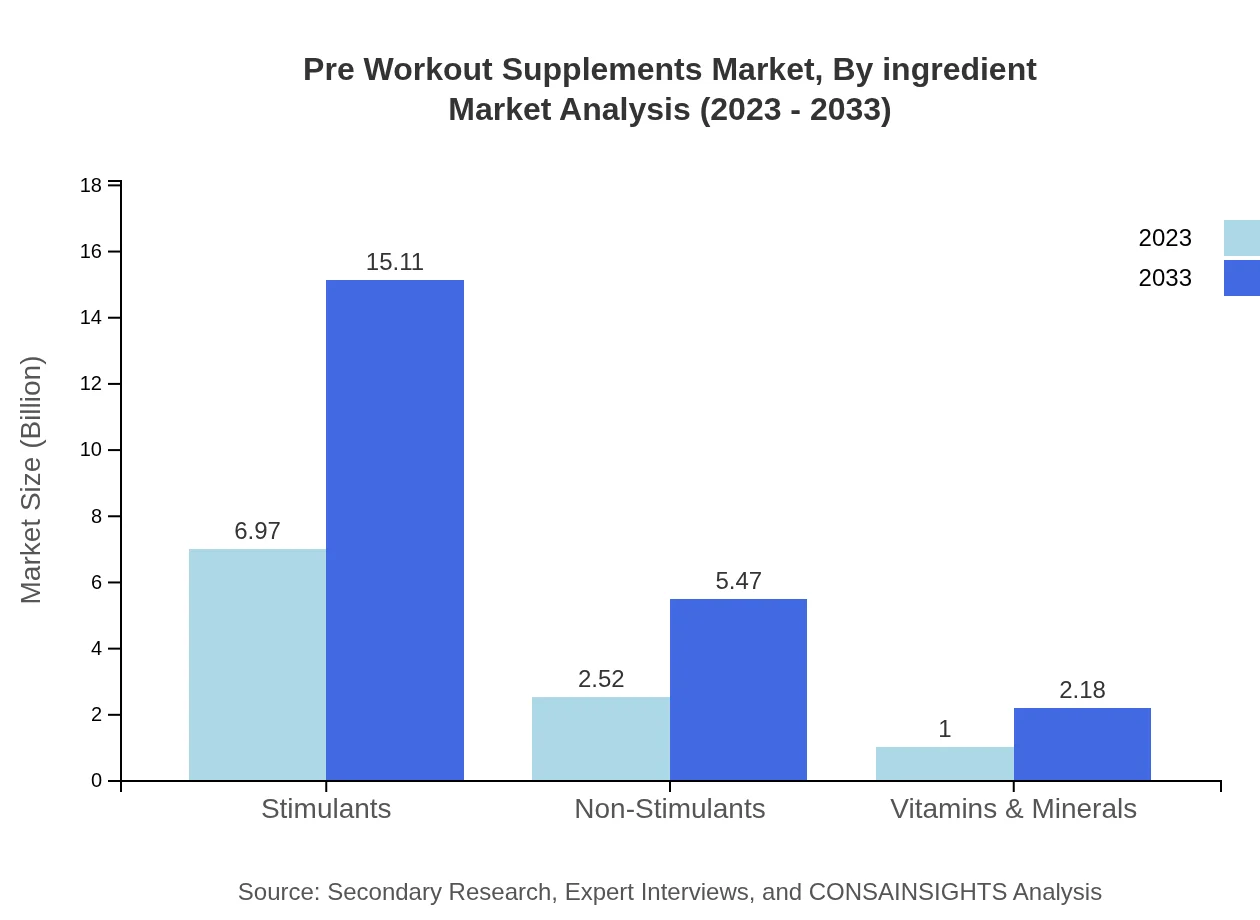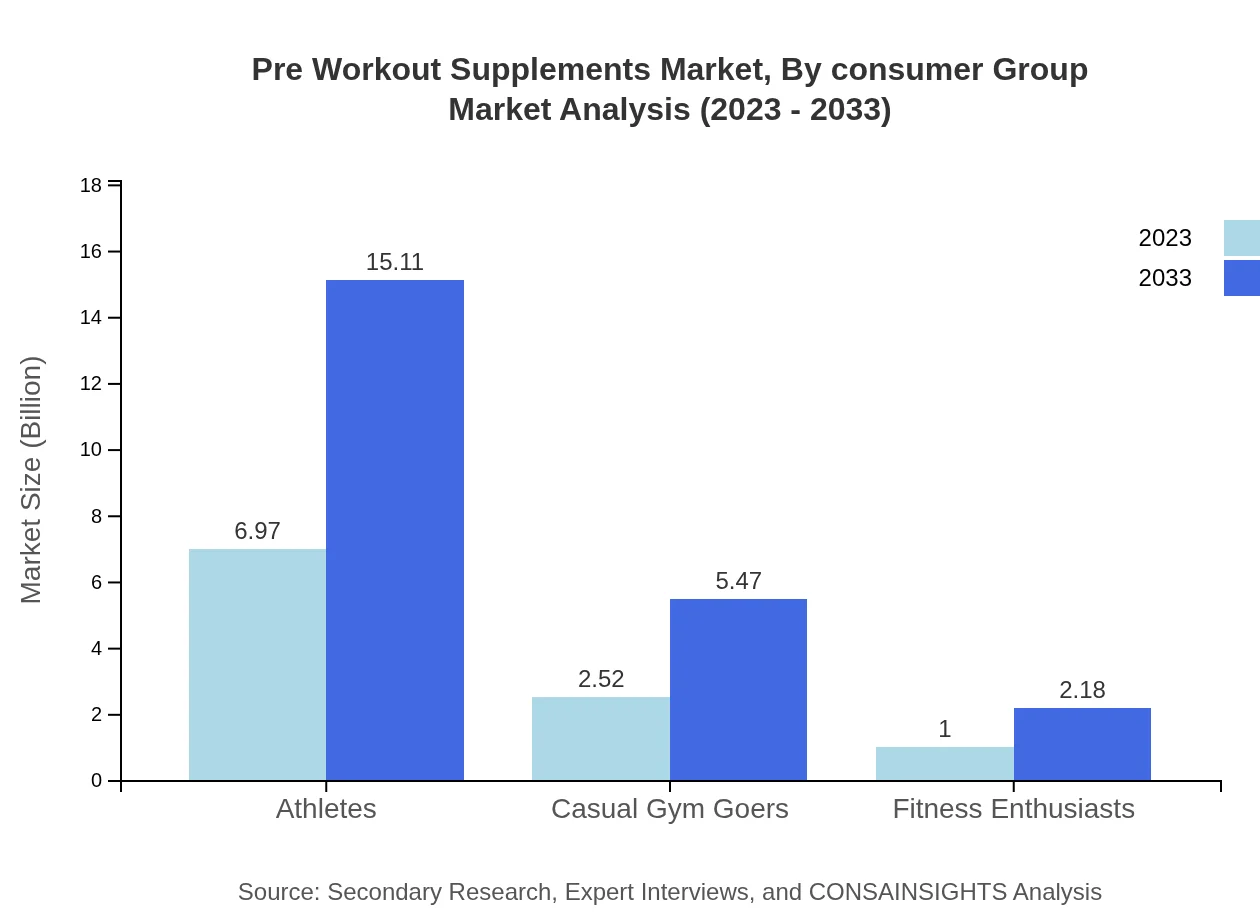Pre Workout Supplements Market Report
Published Date: 31 January 2026 | Report Code: pre-workout-supplements
Pre Workout Supplements Market Size, Share, Industry Trends and Forecast to 2033
This report provides a comprehensive analysis of the Pre Workout Supplements market, covering industry insights, growth projections, market segmentation, and future trends from 2023 to 2033. It offers valuable data to understand the dynamics and opportunities within this thriving sector.
| Metric | Value |
|---|---|
| Study Period | 2023 - 2033 |
| 2023 Market Size | $10.50 Billion |
| CAGR (2023-2033) | 7.8% |
| 2033 Market Size | $22.76 Billion |
| Top Companies | Optimum Nutrition, Cellucor, BSN (Bio-Engineered Supplements and Nutrition), MusclePharm |
| Last Modified Date | 31 January 2026 |
Pre Workout Supplements Market Overview
Customize Pre Workout Supplements Market Report market research report
- ✔ Get in-depth analysis of Pre Workout Supplements market size, growth, and forecasts.
- ✔ Understand Pre Workout Supplements's regional dynamics and industry-specific trends.
- ✔ Identify potential applications, end-user demand, and growth segments in Pre Workout Supplements
What is the Market Size & CAGR of Pre Workout Supplements market in 2023?
Pre Workout Supplements Industry Analysis
Pre Workout Supplements Market Segmentation and Scope
Tell us your focus area and get a customized research report.
Pre Workout Supplements Market Analysis Report by Region
Europe Pre Workout Supplements Market Report:
The European market is poised for significant growth, starting at $3.10 billion in 2023 and projected to reach $6.72 billion by 2033. Growing health consciousness among consumers and a rising trend of fitness activities are influencing market dynamics. Moreover, a shift towards natural ingredients and clean-label products reflects the changing preferences of the European consumer base.Asia Pacific Pre Workout Supplements Market Report:
The Asia Pacific region is gaining traction, with a market size of $2.26 billion in 2023, expected to grow to $4.91 billion by 2033. Rising fitness awareness and the popularity of health clubs are key drivers in this region, particularly among the youth. Countries like India and China are rapidly expanding their fitness and wellness sectors, contributing significantly to market growth.North America Pre Workout Supplements Market Report:
North America remains a dominant player in the Pre Workout Supplements market, valued at $3.56 billion in 2023, with expectations to surpass $7.71 billion by 2033. A strong culture of fitness and sports, combined with high rates of gym memberships and product availability, keeps the market thriving. Innovative product developments and aggressive marketing strategies contribute to sustaining its growth.South America Pre Workout Supplements Market Report:
In South America, the market is relatively smaller, with a size of $0.19 billion in 2023, projected to reach $0.40 billion by 2033. The trend towards fitness and health is slowly gaining momentum, with increasing disposable income leading to greater consumer expenditure on wellness products. Brazil and Argentina are at the forefront of this change.Middle East & Africa Pre Workout Supplements Market Report:
The Middle East and Africa market is estimated at $1.39 billion in 2023, likely to grow to $3.01 billion by 2033. The region’s urban and affluent population is increasingly focused on fitness and health, with a growing number of gyms and fitness centers. However, regulatory barriers and cultural perceptions of dietary supplements may affect market penetration.Tell us your focus area and get a customized research report.
Pre Workout Supplements Market Analysis By Product Type
In the product type segment, powders dominate the Pre Workout Supplements market, valued at $6.97 billion in 2023 and projected to reach $15.11 billion by 2033, representing a 66.4% share in both years. Ready-to-drink beverages and energy gels follow, gaining traction but at a slower rate. With innovations in flavors and packaging, products are being tailored to meet specific consumer preferences.
Pre Workout Supplements Market Analysis By Functionality
By functionality, energy boosting supplements lead the segment, with a market size of $6.97 billion in 2023, anticipated to rise to $15.11 billion by 2033. Endurance enhancing and muscle building products are growing as consumers seek specialized solutions to meet their fitness goals.
Pre Workout Supplements Market Analysis By Ingredient
Stimulants continue to dominate the market, contributing significantly to growth with a size of $6.97 billion in 2023, expected to reach $15.11 billion by 2033. Non-stimulants are also gaining popularity, particularly among consumers preferring a gentler approach to energy enhancement. Vitamins and minerals play a complementary role, with gradual growth expected.
Pre Workout Supplements Market Analysis By Consumer Group
The market is heavily skewed towards athletes, comprising a significant portion with a size of $6.97 billion in 2023, and anticipated to grow to $15.11 billion by 2033. Casual gym-goers and fitness enthusiasts represent growing segments, accounting for $2.52 billion and $1.00 billion respectively, reflecting increased awareness and participation in fitness activities across age groups.
Pre Workout Supplements Market Trends and Future Forecast
Tell us your focus area and get a customized research report.
Global Market Leaders and Top Companies in Pre Workout Supplements Industry
Optimum Nutrition:
Known for its high-quality protein supplements and pre-workout products, Optimum Nutrition has become a household name among fitness enthusiasts, offering a diverse range of formulations to cater to different consumer needs.Cellucor:
Cellucor is renowned for its cutting-edge pre-workout formulas that deliver energy and focus. Its flagship product, C4, is one of the top-selling pre-workout supplements globally, showcasing the brand's commitment to quality and innovation.BSN (Bio-Engineered Supplements and Nutrition):
BSN is recognized for its highly effective supplements that emphasize enhancing physical performance. Their products combine potent ingredients that appeal to serious athletes and casual lifters alike.MusclePharm:
MusclePharm focuses on high-performance supplements that engage fitness consumers with scientifically backed formulations tailored to support various athletic and fitness goals.We're grateful to work with incredible clients.









FAQs
What is the market size of pre Workout supplements?
The global pre-workout supplements market was valued at approximately $10.5 billion in 2023 and is projected to grow at a CAGR of 7.8% over the next decade. This robust growth reflects increasing consumer awareness toward fitness and performance.
What are the key market players or companies in the pre Workout supplements industry?
Key players in the pre-workout supplements market include established brands like Optimum Nutrition, BSN, Cellucor, and MusclePharm, among others. These companies are known for their innovative products and marketing strategies, contributing significantly to market growth.
What are the primary factors driving the growth in the pre Workout supplements industry?
The growth of the pre-workout supplements industry is driven by increasing fitness awareness, rising workout participation rates, celebrity endorsements, and continuous product innovation. Moreover, the rise of e-commerce has made these products more accessible to consumers.
Which region is the fastest Growing in the pre Workout supplements market?
The fastest-growing region in the pre-workout supplements market is North America, which is expected to grow from $3.56 billion in 2023 to $7.71 billion in 2033. Additionally, the Asia-Pacific region also shows significant growth potential, especially in consumer demographics.
Does ConsaInsights provide customized market report data for the pre Workout supplements industry?
Yes, ConsaInsights offers customized market report data tailored to clients' specific needs in the pre-workout supplements industry. This includes detailed insights, regional analysis, and segment breakdowns based on the latest market trends.
What deliverables can I expect from this pre Workout supplements market research project?
Deliverables include a comprehensive market analysis report featuring market size, trends, competitive landscape, consumer behavior insights, and forecasts. Additional data segmentation by region and product type will enhance strategic decision-making.
What are the market trends of pre Workout supplements?
Current market trends in pre-workout supplements include a shift towards natural ingredients, increased demand for non-stimulant products, and innovations in packaging. There is also rising interest in products aimed at specific demographics such as athletes and casual gym-goers.

